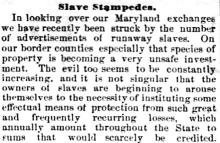Slave Stampedes.
In looking over our Maryland exchanges we have recently been struck by the number of advertisements of runaway slaves. On our border counties especially that species of property is becoming a very unsafe investment. The evil too seems to be constantly increasing, and it is not singular that the owners of slaves are beginning to arouse themselves to the necessity of institution some effectual means of protection from such great and frequently recurring losses, which annually amount throughout the State to sums that would scarcely be credited. Meetings of slave-owners have been held in Kent, Queen Anne's, Worcester, and other counties with the view of calling an Eastern Shore Convention, to take into consideration the existing state of things, and devise, if possible, a remedy. A meeting of the slave-holders and others of Dorchester county, for the same objects, is also called for the 14th instant, at Snow Hill. These meetings have so far been numerously attended, not only by those personally holding slave property, but by other citizens, and have manifested earnest and determined feeling. The Convention will be held, though the time and place has not yet been determined, and the delegates to it have yet to be elected. The proposition has met with such a general approval, and is so obviously requisite, that there is no doubt it will be made a point of union and organization, which cannot fail, to some extent at least, to check the evil complained of. When it assembles, the body will have serious work before it. Something more than speeches and resolutions in their character will have to be determined on, even though they may involve a considerable expenditure of money. Large amounts are appropriated by abolition societies for the very purpose of engaging parties to run off slaves, which operate as so many rewards. A regular system is in operation for this purpose. Certain parties, as appears from the abolition society reports, receive one hundred and fifty dollars for every adult male slave they decoy from their masters. These persons in their turn employ agents to effect their objects, and are thus enabled to make a lucrative business of plundering the citizens of our State of their property. One of these slave-stealers, residing in Delaware, showed by his books to the society which employed him that he had run off to the free States 2,059 slaves. Funds in abundance are furnished by Northern and English fanaticism for this purpose.
It is evident where such organized agencies are at work they must be met and counteracted by something more than the efforts of individuals. Combination and concert of action, whatever form they may take, must be resorted to. Unless our slave-owners are to be compelled to part with their property, and the institution of slavery is to be in this way eliminated and removed from the soil of Maryland, they must devise some efficient means of counteracting the ceaseless machinations against them. People of one State have no right to interfere with the domestic institutions and concerns of another. Those are matters to be decided solely and entirely by the inhabitants of the state itself. Any such interference is a violation of State sovereignty which the people have a right to provide against in the most effectual manner or punish with unrestricted severity. It is a question also of some moment, to enquire how for the citizens of one State have a right to conspire against the laws and the rights of the inhabitants of another. The situation of border States in reference to the institution of slavery is delicate and peculiar. They are presented as a sort of backwater to abolition influences, and though they protect those behind them, they themselves, as in the instance of our own State, suffer severely. Abolitionism, throughout its whole extent including England, contributes to the means of assault upon the property of slave owners on our borders why should not the more southern States in their turn contribute to their protection? The suggestion may be found one worthy of consideration. The proposition to get rid of our free negro population, or to give them the alternative of going back into slavery will no doubt be brought before the Convention. This course is too unjust and harsh to be ultimately adopted, but some means of regulating that class of our population might be devised which would modify many of the objectionable features they now present. Such, for instance, as requiring every free negro to place himself under the protection of some respectable citizen who would be responsible for his good conduct. It cannot be doubted that, in our State as well as others, the free negro element is getting to be a very undesirable one, and must be placed under some different regulations. It is probable, however, that the chief means of protection relied on will be in the formation of a body of border police, a measure which would seem to have become a really necessary one. With a cordon of this kind, and proper vigilance together with suitable regulations for our free negro population, the opportunities of tampering with slavery will be greatly lessened, and the business of decoying negroes from their masters becoming dangerous and ceasing to be profitable, will no longer be pursued with the eagerness with which it is now prosecuted.--Baltimore American.
"Slave Stampedes," Nashville (TN) Daily Patriot, September 9, 1858, p. 2

